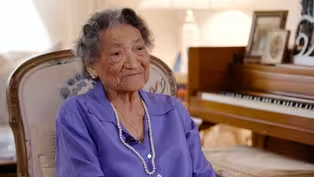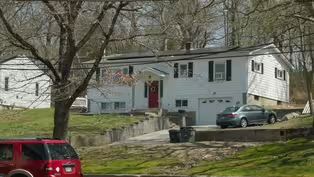
Weekly Insight
Clip: Season 6 Episode 24 | 5m 2sVideo has Closed Captions
Long awaited plans and cost of the Westbound side of Washington Bridge re-build revealed.
On this episode of Weekly Insight, Anaridis Rodriguez and WPRI 12's politics editor Ted Nesi unpack the revised state budget for the new fiscal year, and it’s finally here – the long-awaited plans and cost of rebuilding the Westbound side of the Washington Bridge.
Problems playing video? | Closed Captioning Feedback
Problems playing video? | Closed Captioning Feedback
Rhode Island PBS Weekly is a local public television program presented by Ocean State Media

Weekly Insight
Clip: Season 6 Episode 24 | 5m 2sVideo has Closed Captions
On this episode of Weekly Insight, Anaridis Rodriguez and WPRI 12's politics editor Ted Nesi unpack the revised state budget for the new fiscal year, and it’s finally here – the long-awaited plans and cost of rebuilding the Westbound side of the Washington Bridge.
Problems playing video? | Closed Captioning Feedback
How to Watch Rhode Island PBS Weekly
Rhode Island PBS Weekly is available to stream on pbs.org and the free PBS App, available on iPhone, Apple TV, Android TV, Android smartphones, Amazon Fire TV, Amazon Fire Tablet, Roku, Samsung Smart TV, and Vizio.
Providing Support for PBS.org
Learn Moreabout PBS online sponsorship- Ted, welcome back.
The news we've been all been waiting for is finally out and likely not what a lot of people wanted to hear.
The new Westbound Washington Bridge won't be complete until November of 2028.
That's five years since it's been shut down would be, and also over two years later than originally promised.
- Yeah, it's a sobering moment.
I think Annah it is for people knowing this is gonna be at least a half decade crisis based on that timeline.
And I do think about what we've seen on social media all through this crisis where people have been, a lot of people have been skeptical.
You might even say in some cases, cynical about the timelines and goals State leaders have put out, well, that skepticism has proven warranted.
- A lot has changed, including the cost.
We're learning that the new bridge could cost an estimated $427 million.
That doesn't include emergency cost or demolishing the existing bridge.
All in all, we're looking at this crisis potentially costing taxpayers more than half a billion dollars.
- Right, and let's talk about how much the goalposts have moved.
So the very preliminary early estimate from the state suggested the new bridge could be done perhaps for as little as $250 million.
Now, as you said, we're talking over $500 million and there are concerns at the State House.
I was just there the other night that, is this really the end of price escalation on this project?
Because we've seen cost overruns so many times on big state projects.
So I think that's another fear and concern that's out there for the next few years.
- To all of the state leaders are saying, listen, the procurement process was less than ideal.
We all remember last summer when no vendors responded to the initial RFP, they had to change the criteria.
They even included an incentive for builders if they finish early at a news conference.
The governor spoke about these new plans and he was directly asked if he took accountability for the state's inaccuracies in those early estimates and cost.
And here's some of his response.
- Well, first of all, I think that we got it right.
We tried to accelerate it, but the expertise and the industry let us know that the timeframe was as we're presenting today.
So as far as I'm concerned, we're in a good spot.
- Ted, the governor, seemingly trying to put the best face on this crisis ahead of his reelection campaign.
- Yeah, I mean his advisors I think are under no illusions that this has been a major problem for him.
Politically.
I think it's a big reason.
We've seen his numbers drop so drastically in public opinion polls.
You know, if you, you ask them what's your, what's your case to the voters going to be, they say, look, first of all, they closed the bridge before crisis.
Nobody got hurt.
It didn't collapse.
He inherited this.
You know, many other governors also oversaw the Washington Bridge and left it in this state.
And you know, they're saying they know there have been problems along the way, but in the end they've got a bid, they've got a reputable company, they have a budget in place.
It's not as high as some of the things people are whispering.
A billion dollar bridge.
You know, things like that.
The question is if voters are going to accept that as a reasonable standard for the governor or if they wanted more.
- Yeah, the Washington Bridge also at the forefront of negotiations at the State House legislative leaders this week also unveiling their revised state budget for the new fiscal year, which starts July 1st.
They're putting money into the reserves to cover the state's share of the cost of the bridge, but also a shift in negotiations.
No longer looking at the millionaire's tax, but looking at other tax and fee increases to pay for healthcare.
- Yeah, this has been a theme all through the legislative session Annah it is, the healthcare crisis.
You know, we have hospitals, we have what's going on with Fatima and Roger Williams.
You had anchor medical closing.
The primary care physician shortage we're always hearing about that clearly resonated with how speaker Josh Ache and other legislative leaders, they had to do something, but it was difficult to find more money for healthcare in a budget that was already facing a deficit.
Federal relief funds running out.
So in the end they found over $40 million for primary care, $38 million for hospitals, $12 million for nursing homes.
That's all including federal matches.
But for the state chair that they had to find places to bring in more revenue.
So what are they doing?
$0,02 increase in the gas tax to help close rip as deficit registration fees are going up $4 a month fee now on people's health insurance premiums.
A new tax on ZYN and other nicotine pouches.
So lots of those kind of nickel and dimming kind of things.
- At a press briefing with reporters, how speakers spoke about how he approached those trade-offs.
Let's take a listen.
- We addressed the issues where we thought that the most critical needs were with the resources that were available to us.
And in some cases we had to increase, you know, fees and revenues.
But we were very strategic.
We did not want to hurt working families.
- It seems like the pandemic relief money running out is putting the legislature in a tough place when it comes to balancing the budget.
- Yeah, we're kind of back to where we were before COVID and we're just, I mean this, the state just has a permanent problem.
A ton of the state budget is healthcare and education.
The cost of those services go up significantly more every year than tax revenue goes up, which is why every year, seemingly they are looking for another place to grab some more revenue.
The fee on health insurance, let's put $0,02 on the gas tax, et cetera.
And I don't really see what is going to change that dynamic anytime soon.
So people should be prepared for it in the future too.
- Ted, thank you for being here.
- Good to be here.
Video has Closed Captions
Clip: S6 Ep24 | 9m 15s | World War II nurse, Bennie Fleming, reflects on living a life of service. (9m 15s)
Video has Closed Captions
Clip: S6 Ep24 | 9m 7s | Rhode Island was rated the least affordable state to buy a home in April. (9m 7s)
Providing Support for PBS.org
Learn Moreabout PBS online sponsorship
- News and Public Affairs

Top journalists deliver compelling original analysis of the hour's headlines.

- News and Public Affairs

FRONTLINE is investigative journalism that questions, explains and changes our world.












Support for PBS provided by:
Rhode Island PBS Weekly is a local public television program presented by Ocean State Media

